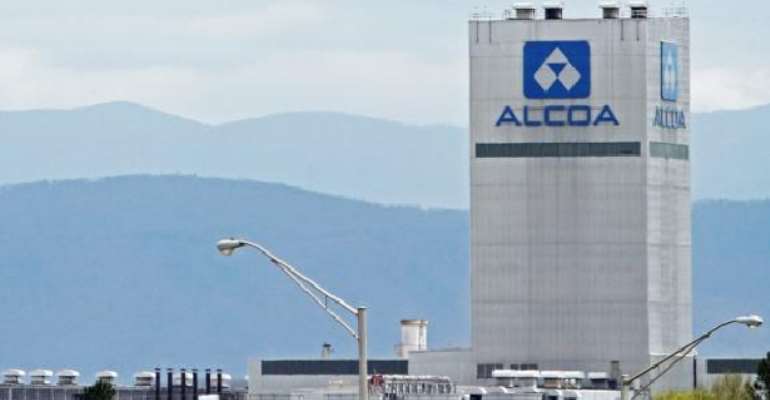Alcoa And Novelis Steel For Next Test In Aluminum Auto Race

Aluminum giants Alcoa Inc and Novelis Inc spent decades wooing Detroit's automakers to toss out their heavy steel vehicle bodies and overhaul their factories in order to mass produce vehicles made out of lighter aluminum.
This year, with Ford Motor Co's launch of its new aluminum-intensive F-150 truck, they are finally reaping the benefits of that long campaign, a once-a-generation shift in demand for an industry struggling with weak metal demand.
Their triumphant moment is being marred, however. A handful of up-and-coming rivals are riding their coattails into an industry that could be worth $10 billion in a decade.
Since Ford unveiled the truck's new design, Constellium NV has announced plans to build a U.S. body sheet plant while Aleris Corp and Wise Metals Group are considering a foray into the burgeoning U.S. sheet market.
To ensure there is a market for their metal, companies are coordinating with automakers, although in most cases their identities have not yet been disclosed.
“Novelis and Alcoa are clearly long-term strong players. We believe there is room for (more) players,” Steven Demetriou, chief executive officer and chairman of Aleris said in an interview.
“We're one of the top players in Europe in automotive rolled products. We're looking to duplicate that in the United States.”
Novelis and Alcoa say they are not worried about competition, given how much automotive sheet is needed. It will be several years before rivals start production, and demand may grow by 40 percent over the next decade.
But the rapid shift into automotive sheet illustrates how quickly a hard-fought innovation can spill over and benefit the competition, as the industry struggles with weak margins and overcapacity, especially in the big beverage can market.
“The next ten years could very well be the best for rolling mills in the industry's history,” said independent analyst Lloyd O'Carroll.
LIGHTENING UP
Aluminum has made inroads in the automotive industry for decades, as a lighter alternative to steel in wheels, engines and more recently the hoods of some models.
Lighter vehicles can run on less fuel, stop and start more quickly and haul heavier loads. Audi and other premium carmakers have built aluminum bodies for years, but relatively high costs have capped aluminum use in the United States.
That changed after U.S. President Barack Obama introduced tougher fuel economy standards in 2009.
But after decades of on-again, off-again talks with Detroit, aluminum executives were not sure whether automakers were serious about using more of the light metal.
For Alcoa, working with Ford meant reinvesting in sidelined research and development, shaking off skepticism after previous disappointments by other carmakers and pulling back automotive specialists deployed elsewhere.
One of the biggest breakthroughs came 15 years ago when Alcoa invented an invisible coating, called A951, which makes bonds between aluminum parts more durable and longer lasting.
“The technology was way ahead of the market,” said Sherri McCleary, a 26-year Alcoa veteran and the A951′s co-inventor.
But even though A951 is patented, Alcoa does not have the technology to itself. At Ford's request, it is licensing it to Novelis and other rivals.
Licensing was a trade off. Without it, the F-150 truck may not have happened at all, because Ford needed so much metal, and few companies would voluntarily saddle themselves with a monopoly supplier. But with it, Alcoa has less market power.
“We agreed to meet our customers' needs, and we think it's going to benefit us in the long haul,” said Michael Murphy, Alcoa's commercial vice president for automotive.
UPSTART NEW ENTRANTS
Automotive aluminum demand in North America is expected to rise 40 percent to 4.5 million tonnes by 2025, according to a study by Ducker Worldwide. At current aluminum prices, that is worth $10 billion and represents just under 10 percent of current global consumption.
Margins for automotive body sheet are as high as $600 per tonne, six times more than in canstock, and Alcoa and Novelis say high barriers to entry will protect their hold on the lucrative market for the foreseeable future.
“It takes a strong balance sheet to do this (and) our relationships with customers are important,” Novelis CEO Phil Martens said.
But rivals are moving quickly, and Constellium and Aleris are touting their European expertise.
In May, Dutch-based Constellium, counting Volkswagen among its customers, sealed a joint venture with Japan's UACJ Corp to produce automotive sheet in Kentucky, starting in 2016.
Aleris, which supplies Audi and Mercedes from its Belgian rolling mill, is in the “final stages” of a study looking into starting U.S. body sheet production, Demetriou said.
Both would compete with Alcoa's new line in Davenport, Iowa, and Novelis' recently commissioned lines in Oswego, New York. Alcoa is also adding capacity in Tennessee and Novelis has another line coming at Oswego.
“It's a really big growth opportunity, and as one of the leaders in this field, we think we can really take a significant share of this growth,” said Laurent Musy, Constellium's president of packaging and automotive rolled products.
Smaller players with less financial clout and no automotive experience may enter the fray in lower-risk supply deals.
U.S. can sheet maker Wise Metals is in talks with Toyota Tsusho Corp and Kobe Steel Ltd to supply coil for body panels and heat exchangers from its Alabama plant. A decision is expected in September.
However the market develops, seeing Alcoa's automotive efforts pay off has thrilled McCleary after spending years refining A951 even when the market was not ready for it.
“There's a lot of satisfaction in knowing that we didn't give up when we knew we had something worth hanging onto,” she said.
REUTERS
